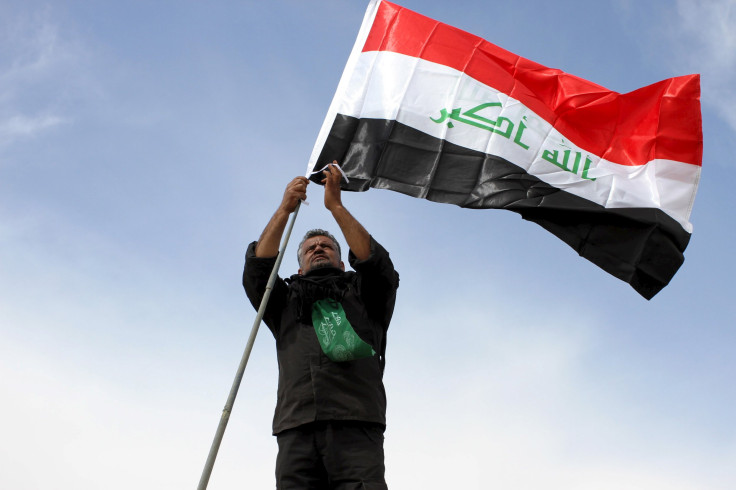Shooting Blind Into Tikrit, Iraqi Forces Hope They Hit Something

SPEICHER BASE, Iraq -- Members of the Iraqi Security Forces fired long-range rockets from behind the main military base in Tikrit Saturday, hitting two targets in the center of the city where the Islamic State group was reportedly stationed. The rockets crashed into a mosque and a hospital, sending clouds of dust into the air. The soldiers manning tanks inside the base cheered as the missiles hit, but no one knew for sure if they had done any real damage to the enemy.
For weeks the Iraqi security forces and volunteer militias have not entered the center of the city they are here to liberate from the Islamic State group (ISIS). Amid political controversy on who should take the lead in the offensive to get ISIS out of the second-biggest city it holds in Iraq after Mosul, the men also fear the improvised explosive devices and land mines littering the center of Tikrit. Their only option is to shoot from where they know it is safe. But firing from a distance is creating a false sense of success, and ISIS fighters are nowhere to be seen.
Shaker Jawdat, the top commander of the federal police in Iraq, said in an interview in Tikrit the security forces and the volunteer fighting groups had sketched out a plan last week in a secret meeting in an operations room in Awja, a town just south of here, to storm the city. That ground offensive has yet to take place, though there is still an advance element of Shiite militiamen on the ground near the center of the city.
Still, leaders of the Hashb al-Shadi, the umbrella militia group also known as the Popular Mobilization Committee, say there is no true way of knowing what is going on inside the city. Karim Nouri, the spokesman for the group, which consists of mostly Shiite volunteer fighters, said his battalions, as well as the Iraqi Security Forces, use drones to gather intelligence on the ISIS locations in the city, but the information is not always accurate. Without knowing how many of the militants remain inside the city, the soldiers here say it is impossible to know who is winning.
The men behind the wall at the military base lob mortars and shoot artillery in what seems like an aimless direction. They shoot with almost no consequences. Not once in the past five days, at least, did the ISIS militants fire back, the soldiers say. At Tikrit University, a complex that sits just next to the Speicher Base, Iraqi Security Forces at times have come under heavy fire, but they make up just a small fraction of the total number of forces involved in the battle. Throughout the entire base, there was only one shooter, a sniper, who seemed to have specific coordinates to target. For hours, the men in the militias, most of which are funded by Iran, sat in armored vehicles, their legs hanging out as they rested. Others stood at the front of the base firing randomly.
There is confusion about the role of the United States, too. An American-led coalition has been preparing the ground for an offensive by bombing ISIS targets from the air, but at the base, that was not entirely clear. No one here seemed to understand the connection between the U.S. and Iraqi military operations. Some even denied the existence of U.S. airstrikes in Tikrit.
“I don’t know about the Americans,” Jawdat said. “As far as I know the only people dropping bombs have been the Iraqi Air Force.” Other fighters here say the U.S. began bombing ISIS in Tikrit because it thought the militias were not hitting targets accurately within the city.
Iraqi Prime Minister Haider al-Abadi traveled to the outskirts of Tikrit Wednesday to try to convince the Shiite militias to stall their movement toward the center of Tikrit until the U.S.-led coalition airstrikes finished. “We refuse to follow America’s orders,” said Jafar al-Jaberi, the top coordinator at the Speicher base. Yet it seemed the men of the Popular Mobilization Committee were complying with Abadi’s request. They stayed either behind the walls at the base or inside Tikrit University.
The delay in storming Tikrit did not seem to bother the men here. Iraqis from across the country, some as young as 17, left their homes to fight ISIS. The incentive, for most of them, was money, though the exact amount of cash offered to each fighter varies significantly from battalion to battalion. Some soldiers say they are earning nothing. Others who fight in larger, more organized battalions such as the Iranian-backed Badr brigade, say they are earning as much as $700 a month.
There was no sense of urgency to defeat ISIS from behind the military wall. The men shot a few rounds, then took a break to visit other soldiers down the line. Most of them did not wear any protective gear, and manned the line in sneakers or loafers.
As the men fired their Kalashnikovs, hoping to hit targets more than a mile away, an airplane dropped a bomb in the center of the city. The men on the front threw their hands up in the air in celebration.
“We got em’!” one soldier yelled from his tank, though no one knew if that was true.
© Copyright IBTimes 2024. All rights reserved.





















